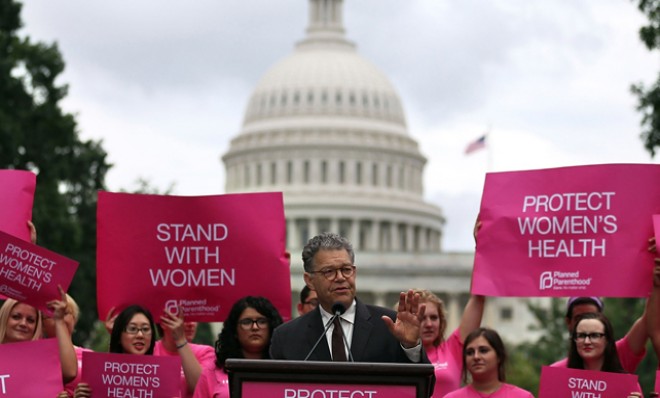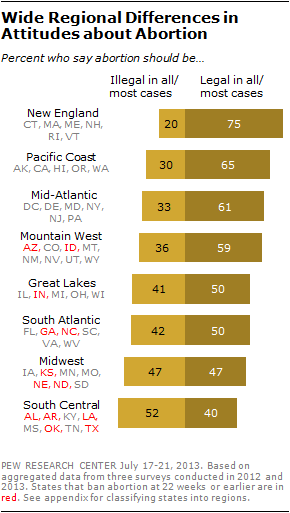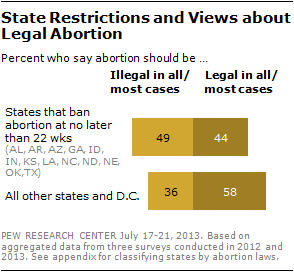The polarizing issue of abortion is only getting more polarizing
Heightened regional differences explain why conservative states have been pushing for tougher abortion laws


Though Americans as a whole have kept a fairly steady view on abortion over the past decade, there have nevertheless been sizable shifts in public opinion within specific geographic regions during that time, according to a Pew Research survey released Monday.
The result has been an increasingly polarized America when it comes to abortion, a fact that helps explain the sudden push for (and subsequent backlash against) new anti-abortion measures nationwide.
Fifty-four percent of respondents in Pew's poll said abortion should be legal in all or most cases, versus 40 percent who said it should mostly or always be illegal. However, there was a vast gulf between the most liberal and most conservative states on the issue. While three-fourths of New Englanders in the survey supported abortion in most or all cases, just 40 percent of "South Central" dwellers — a cluster of eight states that includes Texas, Alabama, and Mississippi — said the same.
The Week
Escape your echo chamber. Get the facts behind the news, plus analysis from multiple perspectives.

Sign up for The Week's Free Newsletters
From our morning news briefing to a weekly Good News Newsletter, get the best of The Week delivered directly to your inbox.
From our morning news briefing to a weekly Good News Newsletter, get the best of The Week delivered directly to your inbox.

That gap is growing, too, as support for abortion has eroded in Midwestern and Southern states over the past ten years.
In the mid-90s, a majority of respondents in every geographic region said abortion should be legal in all or most cases. On the low end, fifty-two percent of people in South Central states said they supported abortion most of the time, while at the high end, 70 percent of New Englanders supported abortion most of the time. That made for an 18-point gap between the most and least accepting regions.
Since then, the split has nearly doubled to 35 points.
The shift helps elucidate why abortion has suddenly emerged as a driving issue in Republican-led statehouses in many areas of the country.
A free daily email with the biggest news stories of the day – and the best features from TheWeek.com
State legislatures have passed a wave of restrictive abortion measures this year — 43 in the first six months of 2013 alone. Most prominently, Texas used a special legislative session to circumvent a filibuster and pass a bill that will ban abortions beyond 20 weeks into pregnancies and impose new restrictions on the state's abortion providers.
Though those efforts have prompted a vocal outcry at the national level, they're actually fairly representative of public opinion at the state level. In states that ban abortions at 22 weeks or earlier, including Texas, 49 percent of respondents said they opposed all or most abortions, versus 44 percent who said the opposite.

While national Democrats could turn the War on Women into a winning political argument in 2014 and beyond, they're unlikely to successfully replicate that formula at the local level in conservative states. That's why Wendy Davis, despite her epic filibuster, has virtually no chance of becoming Texas' next governor.
Jon Terbush is an associate editor at TheWeek.com covering politics, sports, and other things he finds interesting. He has previously written for Talking Points Memo, Raw Story, and Business Insider.
-
 Ghislaine Maxwell: angling for a Trump pardon
Ghislaine Maxwell: angling for a Trump pardonTalking Point Convicted sex trafficker's testimony could shed new light on president's links to Jeffrey Epstein
-
 The last words and final moments of 40 presidents
The last words and final moments of 40 presidentsThe Explainer Some are eloquent quotes worthy of the holders of the highest office in the nation, and others... aren't
-
 The JFK files: the truth at last?
The JFK files: the truth at last?In The Spotlight More than 64,000 previously classified documents relating the 1963 assassination of John F. Kennedy have been released by the Trump administration
-
 'Seriously, not literally': how should the world take Donald Trump?
'Seriously, not literally': how should the world take Donald Trump?Today's big question White House rhetoric and reality look likely to become increasingly blurred
-
 Will Trump's 'madman' strategy pay off?
Will Trump's 'madman' strategy pay off?Today's Big Question Incoming US president likes to seem unpredictable but, this time round, world leaders could be wise to his playbook
-
 Democrats vs. Republicans: which party are the billionaires backing?
Democrats vs. Republicans: which party are the billionaires backing?The Explainer Younger tech titans join 'boys' club throwing money and support' behind President Trump, while older plutocrats quietly rebuke new administration
-
 US election: where things stand with one week to go
US election: where things stand with one week to goThe Explainer Harris' lead in the polls has been narrowing in Trump's favour, but her campaign remains 'cautiously optimistic'
-
 Is Trump okay?
Is Trump okay?Today's Big Question Former president's mental fitness and alleged cognitive decline firmly back in the spotlight after 'bizarre' town hall event



